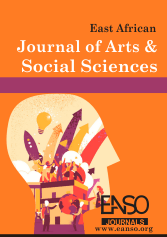Characters' Reaction to Torments in Coetzee’s Selected Novels
Abstract
This study aimed to demonstrate how selected literary texts by John Maxwell Coetzee portray how the characters react to torments surrounding the narration of social life and cultural order to embody and evoke characters’ cultural intricacies and anxieties. The study sought to explore the hidden tensions of the characters fighting within the self. The study also tried to examine how the characters are able or unable to deal with the trauma caused by the contemporary issues of violence, sexuality, and psychological distress. The texts, namely, Disgrace (1999), Slow Man (2005), and Waiting for Barbarians (1980), were purposefully chosen because of their suitability in data that exposes the characters’ torments. The most appropriate theoretical framework that allowed the selected texts to be read, interrogated, analysed, and interpreted, located within the lenses of Psychoanalytic Literary Theory and Concepts related to trauma by Sigmund Freud and Pallavi Sugoy. These theories allowed the analysis of all the important aspects of characters’ psyches, their psychological trauma, thematic concerns, and textual ideologies. The study was not necessarily focusing on trauma per se, but it sufficed to examine the concept of trauma briefly when analysing the characters in the selected texts. The qualitative research method was employed to explore how the characters react to torments in Coetzee’s selected texts. The study employed purposive sampling to select primary texts that vividly depict the specific torments of interest. Consequently, Coetzee’s works - Disgrace, Waiting for the Barbarians, and Slow Man - were chosen for their depth in illustrating these themes. An analytical research design was utilised to examine these literary texts, along with any supplementary secondary data that would facilitate a qualitative analysis of the material. The study aimed to offer insights that would enrich the discourse in the literary realm, particularly concerning the interplay of power dynamics, cultural conflict, and the quest for personal redemption. Since the characters’ experiences are based on the behaviour and incidents of real people, suffering from psychological, dysfunctional sexuality issues and identity, the study can be used in mental institutions to help patients with such problems.
Downloads
References
Coetzee, J. M. (1982). Waiting for the Barbarians. New York: Penguin Books.
Coetzee, J. M. (1992). Doubling the Point: Essays and Interviews. Edited by D. Attwell. Cambridge, MA: Harvard University Press.
Coetzee, J. M. (1999). Disgrace. New York: Penguin.
Coetzee, J. M. (2003). Elizabeth Costello. New York: Viking.
Coetzee, J. M. (2005). Slow Man. New York: Viking Press.
Elizabeth, L. (2009). Some scars don’t show. CNN. https://edition.cnn.com/2009/LIVING/wayoflife/07/01/lisa.elizabeth.abuse/index.html
Foucault, M. (1972). The Archaeology of Knowledge. New York: Harper & Row.
Garland-Thomson, R. (2002). Integrating disability, transforming feminist theory. NWSA Journal, 14(3), 1–32.
Kessler, S. J., Ashenden, S., Connell, R. W., & Dowsett, G. W. (2013). Gender Relations in Global Perspective. Cambridge: Polity Press.
Krafft-Ebing, R. von. (2010). Sexual science and self-narrative: Epistemology and narrative technologies of the self. Journal of the History of Sexuality, 19(1), 1–25.
Rubin, G. (1993). Thinking sex: Notes for a radical theory of the politics of sexuality. In H. Abelove, M. A. Barale, & D. M. Halperin (Eds.), The Lesbian and Gay Studies Reader (pp. 3–44). New York: Routledge.
Thiong’o, N. wa. (1981). Decolonising the Mind: The Politics of Language in African Literature. London: James Currey.
Toni, P. (1991). The novelist and torture: Waiting for the Barbarians. In S. Head (Ed.), A Story of South Africa: J. M. Coetzee’s Fiction in Context (pp. 112–135). Cambridge: Cambridge University Press.
White, P., & Selden, R. (1987). Modern Literary Theory: A Reader (3rd ed.). London: Arnold
Copyright (c) 2025 Carolyne Chebet, Wanjiru Mugo, PhD, Stephen Mutie, PhD, Albert Mugambi Rutere, PhD

This work is licensed under a Creative Commons Attribution 4.0 International License.




























